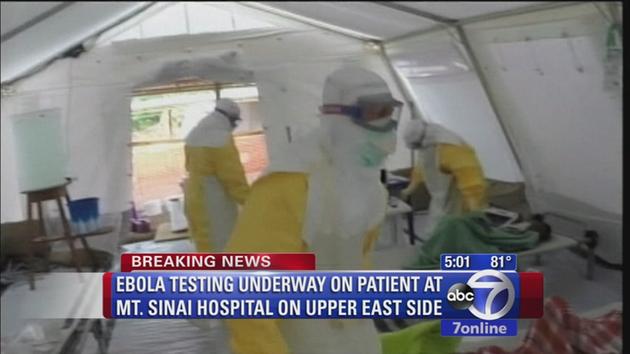Mount Sinai patient tested for Ebola virus
UPPER EAST SIDE (WABC) --
Mount Sinai Hospital is performing tests on a patient who had recently traveled to a West African country where Ebola has been reported, the hospital says. A male patient with high fever and gastrointestinal symptoms came to the hospital's emergency room on Monday morning, officials said.
The hospital says the patient has been placed in strict isolation and is undergoing medical screenings to determine the cause of his symptoms.
"All necessary steps are being taken to ensure the safety of all patients, visitors and staff. We will continue to work closely with federal, state and city health officials to address and monitor this case, keep the community informed and provide the best quality care to all of our patients," the hospital wrote in a statement.
Mt. Sinai is following what the Center for Disease Control recommended last week when they sent a Health Alert to doctors and hospitals.
The New York City Department of Health said, "After consultation with CDC and Mount Sinai, the Health Department has concluded that the patient is unlikely to have Ebola. Specimens are being tested for common causes of illness and to definitively exclude Ebola."
Testing for Ebola is done at the CDC. According to a CDC spokesperson testing for Ebola takes 1-2 days after they receive the samples. The primary testing is PCR. This is performed on blood that has been treated to kill and live virus. So far CDC has tested samples from around 6 people who had symptoms consistent with Ebola and a travel history to the affected region.
ABC News' Dr. Richard Besser cautions, "Many things cause fever and gastrointestinal symptoms. The steps they are taking are wise given the travel history, but nothing about the symptoms is specific to Ebola."
The Ebola virus causes a hemorrhagic fever that has sickened more than 1,300 people in Africa, killing more than 700 mostly in Liberia, Guinea and Sierra Leone. It is spread through direct contact with bodily fluids, such as blood or urine, unlike an airborne virus like influenza or the common cold. A person exposed to the virus can take up to 21 days to exhibit any symptoms, making it possible for infected travelers to enter the U.S. without knowing they have it.
Federal agents at U.S. airports are watching travelers from Africa for flu-like symptoms that could be tied to the recent Ebola outbreak, as delegations from some 50 countries arrive in the nation's capital for a leadership summit this week. Border patrol agents at Washington's Dulles International and New York's JFK airport in particular have been told to ask travelers about possible exposure to the virus and to be on the lookout for anyone with a fever, headache, achiness, sore throat, diarrhea, vomiting, stomach pain, rash or red eyes.
"There is a screening process that individuals have to go through when they board aircraft departing the countries where this outbreak has been reported. There is additional screening that occurs when individuals who started in that region of the world arrive in this country," White House Press Secretary Josh Earnest told reporters.
If a passenger is suspected of carrying the deadly virus, they would be quarantined immediately and evaluated by medical personnel, according to the Centers for Disease Control and Prevention, which provided the additional training to local airports.
"There is always the possibility that someone with an infectious disease can enter the United States," CDC spokeswoman Barbara Reynolds said Monday. "The public health concern is whether it would spread, and, if so, how quickly.'"
While the CDC says it is not screening passengers boarding planes at African airports - the job of local authorities there - the center said it has encouraged vulnerable countries to follow certain precautions. Outbound passengers in the countries experiencing Ebola are being screened for fevers and with health questionnaires, Reynolds said.
Health officials say the threat to Americans remains relatively small, even with the uptick in travel this week between Africa and the United States. In the past decade, five people have entered the U.S. known to have a viral hemorrhagic fever, including a case last March of a Minnesota man diagnosed with Lassa Fever after traveling to West Africa.

No comments:
Post a Comment